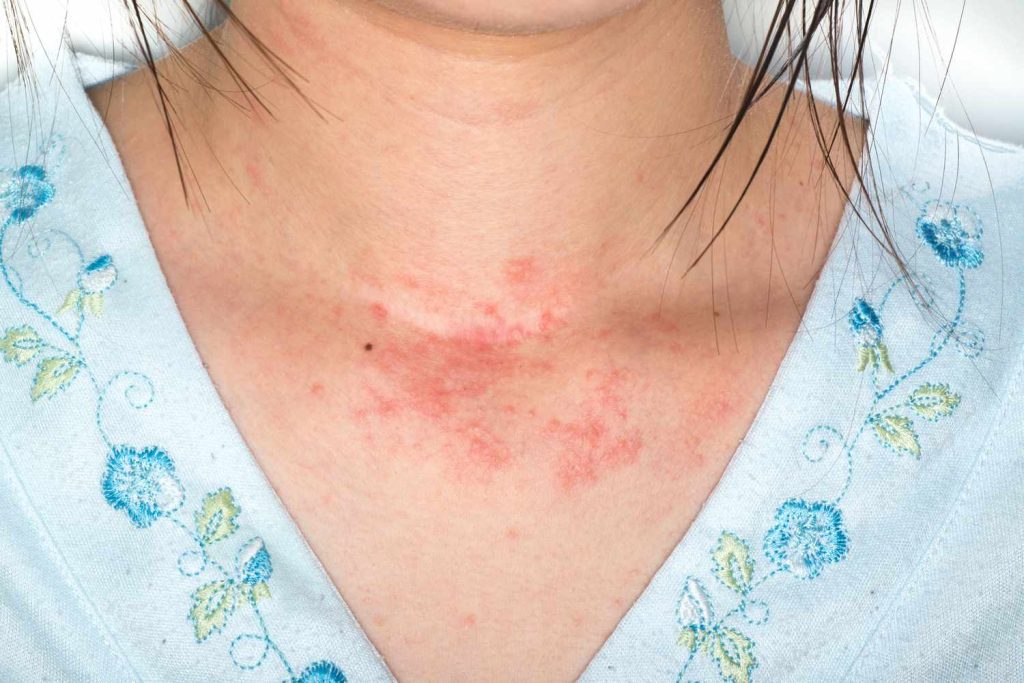The skin is the body’s largest organ and acts as a barrier against the outside world. But sometimes, that barrier gets irritated, leading to uncomfortable and itchy rashes.
While there are many causes of skin irritation, allergic reactions are a frequent culprit. This article delves into three common allergic skin conditions: eczema, hives, and dermatitis, exploring their symptoms, triggers, and treatment options recommended by allergy doctors.
Atopic Dermatitis (Eczema)
Eczema, also referred to as atopic dermatitis, is a chronic inflammatory skin condition causing intense itching and dry, red, or cracked patches of skin. These patches often appear on the face, hands, elbows, and knees, particularly in children. While the exact cause remains unknown, genetics and allergies play a significant role.
Symptoms:
- Intense itching, especially at night
- Dry, red, or cracked skin
- Scaly or thickened patches
- Small, raised bumps that, when scratched, may ooze fluid
Triggers:
- Food allergies, especially to dairy, eggs, peanuts, or soy
- Dust mites
- Pet dander
- Pollen
- Irritants like harsh soaps, detergents, or wool clothing
Treatment: There is no cure for eczema, but allergologists can recommend a plan to manage symptoms and prevent flare-ups. This may include:
- Moisturizers to soothe dry skin
- Corticosteroid creams or ointments to reduce inflammation
- Antihistamines to relieve itching
- Identifying and avoiding triggers
Hives (Urticaria)
Hives, also called urticaria, are characterized by raised, red, itchy welts that appear abruptly on the skin. Unlike eczema, hives typically come and go within a few hours or days, although they can sometimes become chronic.
Symptoms:
- Raised, red, itchy welts (wheals) that may appear in patches or individually
- Wheals that change size and shape
- Swelling of the lips, eyelids, or tongue (in severe cases)
Triggers:
- Food allergies, especially to nuts, shellfish, or eggs
- Medications like penicillin or aspirin
- Insect bites
- Infections
- Stress
Treatment: Treatment for hives focuses on relieving symptoms and identifying triggers. Allergy doctors may recommend:
- Antihistamines to reduce itching and swelling
- Corticosteroid medications in severe cases
- Identifying and avoiding triggers
Contact Dermatitis
Contact dermatitis is an inflammatory skin condition that appears when the skin comes into direct contact with an allergen or irritant. Symptoms typically appear within 48 hours of exposure and improve once the irritant is removed. There are two types:
- Irritant contact dermatitis: This is caused by coming into contact with an irritating substance, such as harsh soaps, detergents, or chemicals.
- Allergic contact dermatitis: This is caused by an allergic reaction to a particular substance, such as nickel in jewelry, latex, or certain fragrances found in cosmetics.
Symptoms:
- Redness, itching, and burning at the contact site
- Dry, cracked, or blistered skin
Treatment: The main treatment for this allergic skin condition is avoiding the irritant or allergen. Additionally, allergy doctors may recommend:
- Moisturizers to soothe the skin
- Corticosteroid creams or ointments in severe cases
Seeking Help from an Allergy Doctor
While these allergic skin conditions can be frustrating and uncomfortable, they are manageable. If you experience any of the symptoms mentioned above, consult an allergy doctor. They can perform allergy testing to pinpoint the triggers and create a personalized treatment plan to control your symptoms and improve your quality of life.
Consult with an allergy doctor within your area of residence through NowServing PH. It is a telemedicine platform in the Philippines that bridges the gap between patients and doctors by providing convenient access to healthcare services.

